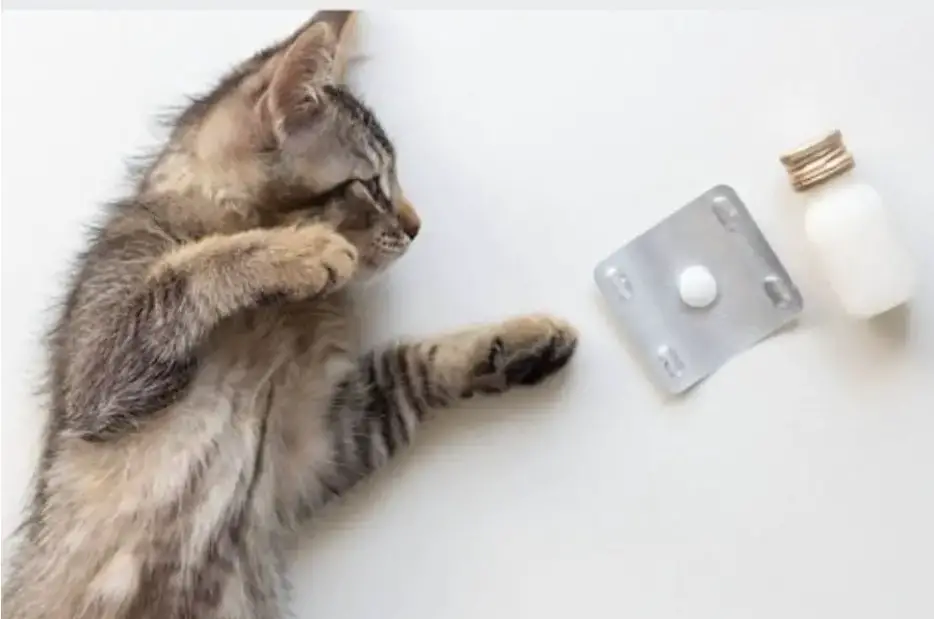Let’s discuss the common side effects of cat dewormers and I will be discussing this topic as a cat owner, not a veterinarian.
In most cat dewormers, the side effects can be written, while some are not written.
I will be discussing this topic based on my personal experience deworming my cat Max and information I gathered from other cat owners.
Side Effects of Cat Dewormers
In my opinion, and based on the information I gathered online, here are some of the most common side effects of cat dewormers on cats:
1. Weakness and fatigue

One common side effect of cat dewormers is a feeling of weakness and fatigue in your cat.
This is often a result of the medication working to eliminate the parasites from your cat’s system.
Your kitty may seem more lethargic or less energetic than usual, preferring to rest and sleep more.
This is generally a temporary side effect and should subside within a few days as your cat’s body adjusts.
You should provide a cozy, quiet space for your cat to rest and recover, and encourage gentle playtime when they seem up for it.
2. Increased thirst and urination
Another potential side effect of deworming your cat is increased thirst and urination.
As the medication works to flush out the worms, your cat’s body may need to process more fluids, leading to more frequent trips to the water bowl and litter box.
Make sure your cat has access to clean, fresh water at all times, and monitor their litter box habits.
If the increased urination persists or seems excessive, be sure to consult your veterinarian.
3. Vomiting
Vomiting is a common side effect that can occur after deworming, as the medication can sometimes cause gastrointestinal upset.
After deworming, your cat may experience nausea or discomfort, leading to vomiting.
This is usually a temporary issue and should be resolved within a day or two.
You should offer small, frequent meals of a bland, easily digestible diet to help settle your cat’s stomach.
If the vomiting is severe or lasts more than a couple of days, you should contact your vet.
4. Diarrhea
Similar to vomiting, diarrhea is another gastrointestinal side effect that can happen after deworming.
As the medication works to eliminate the worms, it can disrupt your cat’s digestive system, leading to loose, watery stools.
You should provide plenty of fresh water to prevent dehydration and consider a probiotic supplement to help restore the balance of gut bacteria.
You should also try feeding them a bland diet, similar to what was mentioned earlier, to help firm up their stools.
If the diarrhea persists or worsens, or if you observe blood in the stool, reach out to your veterinarian for further guidance.
5. Allergic reactions
While rare, based on the information I gathered, allergic reactions can occur after deworming your cat.
You should keep an eye out for any signs of an allergic response, such as excessive itching, redness or swelling of the skin, hives, or difficulty breathing.
If you notice any of these symptoms, it’s crucial to seek immediate veterinary attention.
Allergic reactions can be serious and require prompt medical intervention.
6. Lethargy

After deworming, some cats may experience temporary lethargy or a lack of energy.
Most cats will seem more tired than usual and may not engage in their typical activities after deworming.
Therefore, you should keep an eye on their behavior and monitor how long the lethargy lasts.
If it persists for an extended period or your cat shows other concerning symptoms, consult with your veterinarian for guidance.
7. Temporary loss of appetite
It’s not uncommon for cats to experience a temporary loss of appetite after being dewormed.
If your cat seems disinterested in their food or refuses to eat altogether, it could be a side effect of the medication.
You should monitor their food intake and offer small, enticing meals to encourage them to eat.
However, if the loss of appetite extends beyond a day or worsens, it’s important to consult with your veterinarian.
They can provide recommendations on how to stimulate your cat’s appetite or address any underlying issues.
8. Non-alertness
Some cats may appear less alert or drowsy after deworming, they may seem less responsive to their surroundings and have a general lack of awareness.
While this side effect is typically temporary, it’s important to monitor your cat’s behavior closely.
You should ensure they are comfortable and in a safe environment.
However, if the non-alertness persists, or you notice other concerning symptoms, it’s best to reach out to your veterinarian for advice.
9. Abdominal discomfort
It’s possible for cats to experience some abdominal discomfort after being dewormed.
You should keep an eye out for signs such as restlessness, pacing, or an unusual sensitivity when their abdomen is touched.
They may also display signs of discomfort, like excessive grooming or vocalization.
If you notice any of these symptoms, it’s essential to monitor your cat closely.
If the discomfort persists or worsens, it’s best to consult with your veterinarian.
They can assess the situation and recommend appropriate measures to alleviate your cat’s discomfort.
10. Worms in stool
One of the goals of deworming is to eliminate worms from your cat’s system. After deworming, it’s possible to see worms in your cat’s stool.
Keep an eye on their litter box and look for any signs of worms. These could include small, white, or off-white worm-like structures.
If you spot worms in your cat’s stool, it’s an indication that the deworming medication is working.
However, if you notice an excessive amount of worms or if your cat shows any other concerning symptoms, it’s important to consult with your veterinarian.
They can confirm the effectiveness of the deworming treatment and address any additional concerns.
How to Manage Side Effects of Cat Dewormers

Dealing with the potential side effects of cat dewormers can be a tricky situation, but with the right approach, you can help your cat sail through the process smoothly.
The most common side effects include mild gastrointestinal upset, such as vomiting or diarrhea, which can be managed by ensuring your cat stays hydrated and providing a bland, easily digestible diet.
In some cases, your veterinarian may recommend an anti-nausea medication to help alleviate any discomfort.
You should try to monitor your cat’s behavior closely and report any persistent or severe symptoms to your vet immediately.
You should also provide a calm, stress-free environment, and offering plenty of affection can also go a long way in helping your cat cope with the side effects.
Additionally, you will have to provide your cat with plenty of fresh water and a balanced diet can help alleviate any digestive issues.
You should keep an open communication with your veterinarian to ensure a successful deworming process and a healthy, happy cat.
Final Thoughts
In summary, while cat dewormers are essential for maintaining your feline friend’s health, it’s crucial to be aware of potential side effects.
Keep an eye out for symptoms like vomiting, diarrhea, or behavioral changes, and consult your veterinarian if you notice any concerning signs.
Remember, a proactive approach to deworming can ensure a happy and healthy life for your beloved cat.
Related: Why your cat is lethargic not eating or drinking.
Related questions
What are the common side effects of cat dewormers?
Common side effects of cat dewormers include mild gastrointestinal upset, such as vomiting, diarrhea, or decreased appetite. These symptoms usually resolve on their own within a day or two. If they persist or worsen, consult your veterinarian for guidance.
Can my cat experience allergic reactions to dewormers?
While rare, some cats may develop an allergic reaction to certain dewormers. Signs include itching, swelling, hives, difficulty breathing, or collapse. If you notice any of these symptoms, seek immediate veterinary attention.
How can I minimize the side effects of deworming in my cat?
To minimize side effects, administer the dewormer with a small amount of food to reduce stomach irritation. Also, ensure your cat has access to fresh water and a quiet place to rest. This can help alleviate temporary lethargy or digestive imbalance.
What if my cat experiences persistent side effects after deworming?
If your cat experiences persistent side effects, such as vomiting, diarrhea, or lethargy, beyond three days, consult your veterinarian. They can assess your cat’s condition and provide appropriate guidance or additional treatment if necessary.









